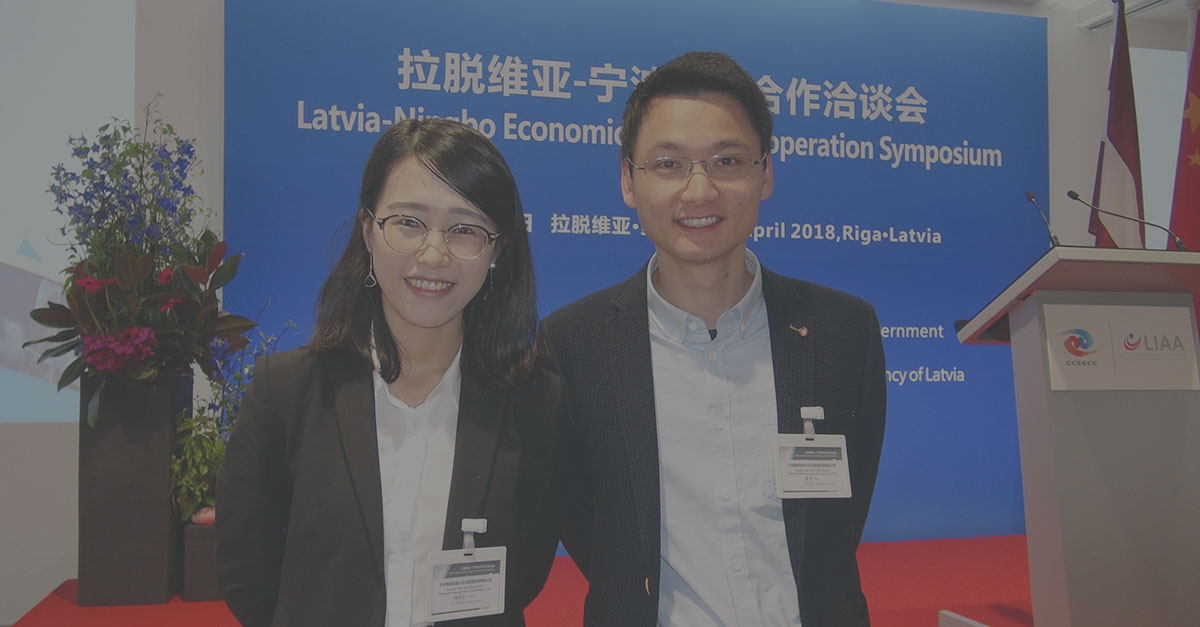
China sees itself as occupying a leading position in the world of e-commerce. This was a primary message at the Latvia-Ningbo Economic and Trade Cooperation Symposium that took place in Riga at the end of April.
With more than seven thousand years of history, the city of Ningbo is one of the centers of industrial competence, e-commerce and scientific research in the PRC today. The population of Ningbo is nearly eight million and the economy of this Chinese city amounted to $255 billion in 2015.
In 2017, the economy in Ningbo grew by 15%, a rate that was higher than the average in China. Ningbo’s national technological park and industrial zone of high tech developments are evolving in cooperation with the Industrial Institute of Beijing.
Bilderlings discussed the issues of innovative technology developments in the area of financial transactions and online commerce with Cai Jie, a partner and vice general manager of BGEI in Ningbo, and with his assistant Fu Jiayn. They shared their opinions on intellectual property solutions in the area of e-commerce.
Cai Jie: A lot of Chinese companies work with intellectual property. They work with basic technologies, widespread serial apps, as well as with more advanced ones. Technologies developed by Alibaba are mostly used in China. As you know, Western solutions – such as Facebook Marketplace – are prohibited in China. But there are better alternatives there, like WeChat.
There are more than 900 million active users of the multifunctional messenger WeChat in China today. People who have provided their personal data and bank account information can use this app for making payments on bills, orders for goods and services, money transfers to other users, payment for purchases in shops, and marketing of their own online services and products for sale. Users of this service can create ”an app within an app”, linking their bank accounts in China with online shops and Visa, MasterCard and JCB card accounts in WeChat.
Cai Jie: Development of Chinese companies that work with intellectual property and develop technological solutions, including those in the area of financial technologies, requires investing huge financial resources. Large companies, such as online trading market sites – Taobao and Tmall within Alibaba corporation, offer them all they need for work but don’t buy them.
Due to active expansion in recent years, the global share of China’s e-commerce now amounts to more than 40%, despite the fact that Western marketplaces and social media don’t offer their users such universal solutions as WeChat. We don’t have Facebook, Telegram or other sites with payment options, but this absence of competition still hasn’t slowed down development of intrinsic Chinese payment solutions.
Digital marketing in China enables commercial activities to take place in this country via chats and message exchange, in addition to such options as social media posts, and mini-browser and software programs which allow companies to make complete e-commerce proposals within the app.
In contrast to Facebook and other social media, WeChat has allowed companies to open accounts and to integrate online shops of any legal profile at the single platform for free.
It is significant that more than a billion users of this app in China, Bhutan and other countries in Southeastern Asia contribute to trade development in this region by means of cross-border regional payments. However, this messenger is almost useless in Europe, the US and other jurisdictions outside of the WeChat global coverage area, and integration of promising Chinese solutions in e-commerce and financial technologies with the Western ones, including content marketing, is still a complicated task.
More than 500 million users in China make most of their payments through WeChat Pay – it is possible to receive money from people and juridical entities via personal accounts linked to bank card accounts. With that, a greater share of payments is made from a debit card-linked account. In this messenger, credit card can only be used to pay companies-providers. The available limit for money withdrawal in this service is 1000 yuans (about 140 euros). For larger sums, 0.1% commission is charged.
Cai Jie: Between 80% to 90% of the population in China use e-payments, mostly through competing WeChat Pay and Alipay services, as well as via the less important Baidu Wallet and Sina Weibo. Cash is not popular in China. It is possible to pay for everything through iPhone or smartphone, so people in China don’t carry cash with them.
Fu Jiayn: There is also UnionPay – a card system which is very popular in Russia, less known in Latvia and Europe but still widespread due to increasing flows in the area of tourism. I don’t pay by card or cash in China: I use WeChat Pay and Alipay instead.
Chinese people use their phones for making literally all of their purchases. I don’t remember the last time I paid in cash. I just can’t imagine a situation where one would need cash, even in the villages of Inner Mongolia, Tibet or Xinjiang Uygur province. You just need to go to China and to see it with your own eyes – you can pay by phone for everything.
Cai Jie: We have plenty of solutions – thousands and thousands every day. Five million startups are launched in China every year – for comparison, in the United States they launch two million startups a year. The All-China transition to new formats of e-commerce within the framework of digital economy development and the Belt and Road Initiative will become an incentive and example for countries in Europe and America, where many businesses are already abandoning outdated sales models.
According to projections and plans China will become the world’s economic leader by 2020 by all significant indicators. But what about a product line? How to choose consumer goods or hi-tech products in large volumes? Johnson Chen, a representative of the company ZheJiang GreatTao from Ningbo, told Bilderlings about the peculiarities of aggregators in the B2B sector.
Johnson Chen: There are a lot of B2B platforms in China, many of them have been opened in recent years. It is very convenient for everybody because competition stimulates development. We started operations in 2006 and finished 2017 with $3.5 billion in turnover.
ZheJiang GreatTao is oriented to cross-border trade. About 50 thousand large and medium importers from the EU countries, the UK, the US, as well as exporters of goods manufactured in the Western jurisdictions for the domestic market in China, are among the company’s partners. It’s worth mentioning that with respect to wholesale purchases this market still mostly remains a terra incognita for the West, as if it hasn’t been many centuries since the first voyage of Marco Polo to the Heavenly Empire. This is not about fraud, the risk of which is decreasing significantly: this is about risks associated with miscommunication.
Johnson Chen: As our partners are located outside China, we help them buy and sell in China. The main suppliers of goods are part of the Alibaba Group. We search for them on the Alibaba site, thoroughly examine their profiles, credit history, quality of goods, number of sales for the preceding year, reputation, absence of customer complaints. We work with intellectual property as well.
We work with any type of goods that can be sold and we take into account the six most important aspects: company, supplier, certification, credit history, environment and customer orientation. Over the past three years we have worked with nearly every country in the world.
Unlike in the aforementioned cases, most of ZheJiang GreatTao payments are made in euros and US dollars via bank accounts, including accounts linked with MasterCard and Visa. But Johnson Chen’s opinion regarding liberal payment solutions is rather conservative, as he favors the current prohibition of ICO and cryptocurrency mining in China.
Johnson Chen: We work with all payment systems, but I guess it’s not worth talking about alternative payment systems and related e-commerce solutions at the present moment. After many years of work, we came to the conclusion that the main problem with payment systems is not one of technology but of state control. Technically everything is simple, but any state will strive to throw sand in the machine. So there are nuances everywhere. ICO prohibition in China is associated with the risks of the emergence of a strong shadow economy.
Yes, I can pay in cryptocurrency in Tokyo. Japan doesn’t see it as a problem. But the approach to investments in Japan is totally different: it is based on speculation. We focus on medium-size markets, or at least not on the smallest ones. In this respect Latvia is an attractive country for us.
Subscribe to our page on Facebook to stay up-to-date on the latest news from the e-commerce world, and also contact Bilderlings Pay if you need to connect to a payment acceptance solution and we will find the best offer for you.








